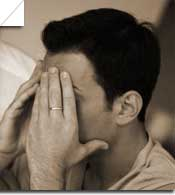Introduction
In 1907, Dr James Ramsay Hunt, an American neurologist, described the syndrome of herpes zoster associated with facial palsy as Ramsay (often misspelled as Ramsey) Hunt syndrome II. A great part of the illness is Bell's palsy which itself has many causal factors and is the most common form of facial paralysis worldwide.
It has been seen that Bell's palsy and Ramsay Hunt syndrome can occur at the same time but one does not necessarily lead to an occurrence of the other nor are they caused by the same virus. For example, the Herpes simplex virus type 1 is found to be present in Bell's palsy patients but not in Ramsay Hunt syndrome subjects.

What is it?
Ramsay Hunt syndrome is a neurological condition caused by the varicella-zoster virus, the same virus that causes chickenpox and shingles. It affects the facial nerve and can cause facial paralysis and hearing loss.
Who is Ramsay Hunt?
Dr. James Ramsay Hunt (1874-1937) was an American neurologist who first described this syndrome in 1907. He was a prominent figure in neurology and made significant contributions to the understanding of neurological disorders.
How is it caused?
The condition is caused by the varicella-zoster virus, which remains dormant in nerve cells after a person has had chickenpox. When the virus reactivates, it can affect the facial nerve, leading to the characteristic symptoms of Ramsay Hunt syndrome.
What are the symptoms?
- Facial paralysis on one side
- Painful rash or blisters in or around the ear
- Hearing loss
- Tinnitus (ringing in the ear)
- Vertigo or dizziness
- Difficulty closing the eye
- Loss of taste
Who can be affected?
Anyone who has had chickenpox can develop Ramsay Hunt syndrome. It most commonly affects adults over 60, but can occur at any age. The risk increases with age and in people with compromised immune systems.
How is it diagnosed?
Diagnosis is typically based on clinical symptoms, particularly the presence of facial paralysis combined with a characteristic rash around the ear. Additional tests may include blood tests, MRI scans, or nerve conduction studies.
What is the prognosis?
The prognosis varies depending on the severity and how quickly treatment begins. Early treatment within 72 hours of symptom onset generally leads to better outcomes. Some people recover completely, while others may have lasting effects.
Can it be treated?
Treatment typically includes antiviral medications (such as acyclovir) and corticosteroids to reduce inflammation. Pain management and supportive care are also important components of treatment.
Will it come back?
Recurrence is rare but possible. Most people who recover from Ramsay Hunt syndrome do not experience it again, but the virus can potentially reactivate in some cases.
Medical Disclaimer: This information is for educational purposes only and should not replace professional medical advice. Always consult with a qualified healthcare provider for diagnosis and treatment of medical conditions.